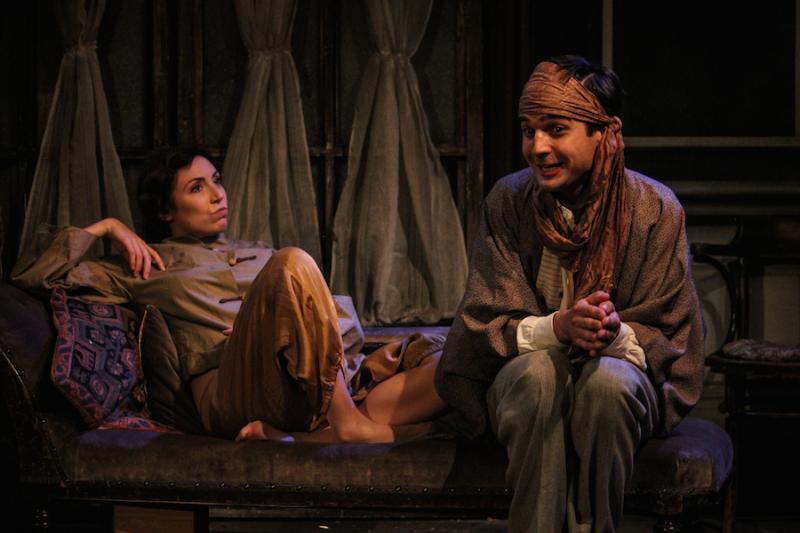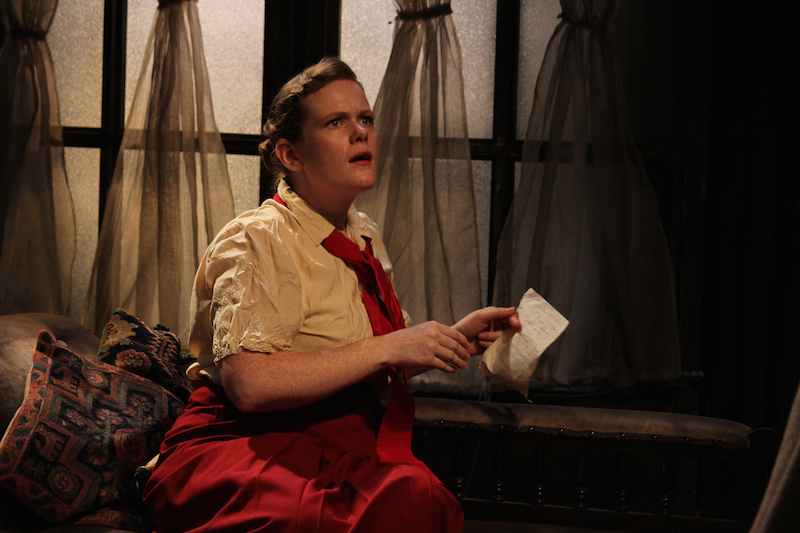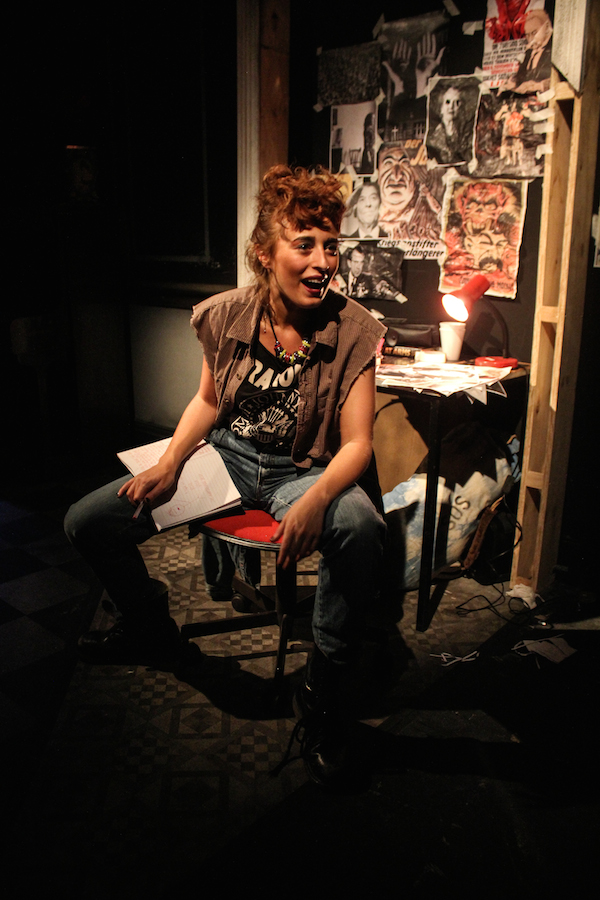A Bright Room Called Day, Southwark Playhouse | reviews, news & interviews
A Bright Room Called Day, Southwark Playhouse
A Bright Room Called Day, Southwark Playhouse
Tony Kushner’s play chronicling Nazi ascent in Germany lacks punch

The pivotal early 1930s period in which Herr Hitler overcame strong if fractured left-wing opposition should make for meaty drama, but the sluggish polemic currently occupying Southwark Playhouse will leave carnivorous viewers unsatiated.
 The play nominally examines a group of Berlin-based artists observing their nation’s dramatically shifting landscape, although in truth they are more useful personifications of political viewpoints than fully developed characters. Middle-aged actress Agnes (Alana Ramsey, pictured right), who develops skits for the communist party, and her Hungarian Trotskyite lover Husz host salons for friends Paulinka, an opium-addicted starlet, committed socialist campaigner Gotchling, and flamboyantly homosexual Baz, a psychologist convinced extremism stems from sexual frustration. Their differing responses to the rise of Nazism form the second-half conflicts, although these remain curiously muted for such charged subject matter.
The play nominally examines a group of Berlin-based artists observing their nation’s dramatically shifting landscape, although in truth they are more useful personifications of political viewpoints than fully developed characters. Middle-aged actress Agnes (Alana Ramsey, pictured right), who develops skits for the communist party, and her Hungarian Trotskyite lover Husz host salons for friends Paulinka, an opium-addicted starlet, committed socialist campaigner Gotchling, and flamboyantly homosexual Baz, a psychologist convinced extremism stems from sexual frustration. Their differing responses to the rise of Nazism form the second-half conflicts, although these remain curiously muted for such charged subject matter.
The main issue is Kushner’s decision to stay at a distance: the arch bohemians offer a running commentary on events, but seldom engage directly with them. Instead, they adopt a stylish air of suffering, striking mannered poses while sighing “I feel like I’m in a film all the time”, or – without a trace of irony – rebuking one another for “bad romantic posturing” or their “carefully constructed but immobile” existence. Kushner is tantalisingly close to producing a brilliant self-referential farce, but decided instead to maintain the straight-faced, explicit didacticism of the source material, Brecht’s The Private Life of the Master Race, without also translating the searing political incisiveness.
 Most problematic is the presence of 1980s Long Islander Zillah (Charlotte Jacobs, pictured left), who in between gabbling conspiracy theories and scrawling letters – in green ink, no doubt – is at great pains to convince us of the parallels between Hitler and President Reagan. It’s a link one might hope would be illustrated rather than stated, but Kushner, while aiming for the metaphorical power of The Crucible, seemingly lacks faith in his material. The tonal shifts between Zillah’s rambling and events in Berlin jar, as do the jumps from staid naturalism to heavy-handed symbolism, with both a ghostly embodiment of history repeating and the devil himself making creaky appearances. Seb Harcombe offers no solutions with a rather plodding production lacking the artistic daring we might expect in the Southwark’s studio space.
Most problematic is the presence of 1980s Long Islander Zillah (Charlotte Jacobs, pictured left), who in between gabbling conspiracy theories and scrawling letters – in green ink, no doubt – is at great pains to convince us of the parallels between Hitler and President Reagan. It’s a link one might hope would be illustrated rather than stated, but Kushner, while aiming for the metaphorical power of The Crucible, seemingly lacks faith in his material. The tonal shifts between Zillah’s rambling and events in Berlin jar, as do the jumps from staid naturalism to heavy-handed symbolism, with both a ghostly embodiment of history repeating and the devil himself making creaky appearances. Seb Harcombe offers no solutions with a rather plodding production lacking the artistic daring we might expect in the Southwark’s studio space.
Harcombe also fails to underscore the play's thematic relevance, with its pointed critique of armchair liberalism and infighting among parties with similar goals. Instead, the stultifying debate leaves us almost entirely disengaged, despite the young cast's eager efforts. Alana Ramsey does well to convey sensible Agnes’s passion and Charlie Archer as Baz offers moments of vulnerability when he’s not doing his best Noël Coward impression. Holly Morgan is a brisk Gotchling, Charlotte Jacobs as Zillah begins at a high pitch and has nowhere to go, Laura Hanna provides a surface-level reading of narcissistic Paulinka, and Ethan Holmes as Husz brings dynamism, though struggles to transcend his eye patch, plus-fours and variable cod accent. Elizabeth Andrewatha and Jonathan Leinmuller give absurdist life to dithering communist representatives, but histrionic portrayals of the spectre and devil respectively. All contribute to a decent depiction of elegant inaction, but it makes for an exceedingly wearisome viewer experience.
- A Bright Room Called Day is at Southwark Playhouse until 16 August
rating
Share this article
Add comment
The future of Arts Journalism
You can stop theartsdesk.com closing!
We urgently need financing to survive. Our fundraising drive has thus far raised £49,000 but we need to reach £100,000 or we will be forced to close. Please contribute here: https://gofund.me/c3f6033d
And if you can forward this information to anyone who might assist, we’d be grateful.

Subscribe to theartsdesk.com
Thank you for continuing to read our work on theartsdesk.com. For unlimited access to every article in its entirety, including our archive of more than 15,000 pieces, we're asking for £5 per month or £40 per year. We feel it's a very good deal, and hope you do too.
To take a subscription now simply click here.
And if you're looking for that extra gift for a friend or family member, why not treat them to a theartsdesk.com gift subscription?
more Theatre
 The Assembled Parties, Hampstead review - a rarity, a well-made play delivered straight
Witty but poignant tribute to the strength of family ties as all around disintegrates
The Assembled Parties, Hampstead review - a rarity, a well-made play delivered straight
Witty but poignant tribute to the strength of family ties as all around disintegrates
 Mary Page Marlowe, Old Vic review - a starry portrait of a splintered life
Tracy Letts's Off Broadway play makes a shimmeringly powerful London debut
Mary Page Marlowe, Old Vic review - a starry portrait of a splintered life
Tracy Letts's Off Broadway play makes a shimmeringly powerful London debut
 Little Brother, Soho Theatre review - light, bright but emotionally true
This Verity Bargate Award-winning dramedy is entertaining as well as thought provoking
Little Brother, Soho Theatre review - light, bright but emotionally true
This Verity Bargate Award-winning dramedy is entertaining as well as thought provoking
 The Unbelievers, Royal Court Theatre - grimly compelling, powerfully performed
Nick Payne's new play is amongst his best
The Unbelievers, Royal Court Theatre - grimly compelling, powerfully performed
Nick Payne's new play is amongst his best
 The Maids, Donmar Warehouse review - vibrant cast lost in a spectacular-looking fever dream
Kip Williams revises Genet, with little gained in the update except eye-popping visuals
The Maids, Donmar Warehouse review - vibrant cast lost in a spectacular-looking fever dream
Kip Williams revises Genet, with little gained in the update except eye-popping visuals
 Ragdoll, Jermyn Street Theatre review - compelling and emotionally truthful
Katherine Moar returns with a Patty Hearst-inspired follow up to her debut hit 'Farm Hall'
Ragdoll, Jermyn Street Theatre review - compelling and emotionally truthful
Katherine Moar returns with a Patty Hearst-inspired follow up to her debut hit 'Farm Hall'
 Troilus and Cressida, Globe Theatre review - a 'problem play' with added problems
Raucous and carnivalesque, but also ugly and incomprehensible
Troilus and Cressida, Globe Theatre review - a 'problem play' with added problems
Raucous and carnivalesque, but also ugly and incomprehensible
 Clarkston, Trafalgar Theatre review - two lads on a road to nowhere
Netflix star, Joe Locke, is the selling point of a production that needs one
Clarkston, Trafalgar Theatre review - two lads on a road to nowhere
Netflix star, Joe Locke, is the selling point of a production that needs one
 Ghost Stories, Peacock Theatre review - spirited staging but short on scares
Impressive spectacle saves an ageing show in an unsuitable venue
Ghost Stories, Peacock Theatre review - spirited staging but short on scares
Impressive spectacle saves an ageing show in an unsuitable venue
 Hamlet, National Theatre review - turning tragedy to comedy is no joke
Hiran Abeyeskera’s childlike prince falls flat in a mixed production
Hamlet, National Theatre review - turning tragedy to comedy is no joke
Hiran Abeyeskera’s childlike prince falls flat in a mixed production
 Rohtko, Barbican review - postmodern meditation on fake and authentic art is less than the sum of its parts
Łukasz Twarkowski's production dazzles without illuminating
Rohtko, Barbican review - postmodern meditation on fake and authentic art is less than the sum of its parts
Łukasz Twarkowski's production dazzles without illuminating
 Lee, Park Theatre review - Lee Krasner looks back on her life as an artist
Informative and interesting, the play's format limits its potential
Lee, Park Theatre review - Lee Krasner looks back on her life as an artist
Informative and interesting, the play's format limits its potential

Comments
Hi there, Sorry to be a
Correction made,
Correction made, notifications always welcome. Many thanks.